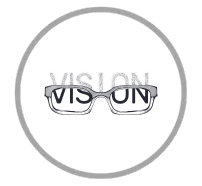Eye Care Trends
AI and the Future of Eye Care
FSDAVCFEBFEVSDDVFSD
FSDAVCFEBFEVSDDVFSD
FSDAVCFEBFEVSDDVFSD
Innovation is changing everything
Technology is transforming healthcare, and eye care is no exception. Artificial intelligence (AI) is already enhancing the detection of eye diseases, improving diagnostics, and making care more accessible. These advancements are no longer futuristic—they’re actively changing how optometrists provide treatment.
At Kleinwood Vision, we embrace the latest technologies. Our clinic utilizes advanced diagnostic tools like OCT and retinal imaging, ensuring precise and early detection of eye conditions. We’re also closely monitoring emerging innovations such as AI in optometry and smart glasses. These tools promise earlier diagnosis, improved management, and greater convenience, helping patients maintain optimal eye health with more effective and personalized care.
Technology is transforming healthcare, and eye care is no exception. Artificial intelligence (AI) is already enhancing the detection of eye diseases, improving diagnostics, and making care more accessible. These advancements are no longer futuristic—they’re actively changing how optometrists provide treatment.
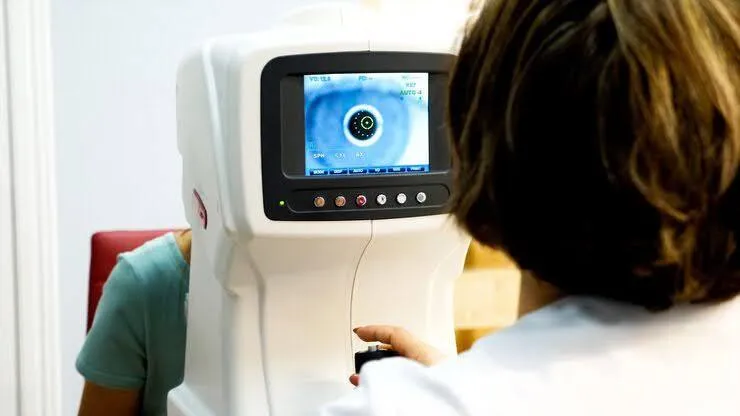
At Kleinwood Vision, we embrace the latest technologies. Our clinic utilizes advanced diagnostic tools like OCT and retinal imaging, ensuring precise and early detection of eye conditions. We’re also closely monitoring emerging innovations such as AI in optometry and smart glasses. These tools promise earlier diagnosis, improved management, and greater convenience, helping patients maintain optimal eye health with more effective and personalized care.

AI Tools Revolutionizing Diagnostic Accuracy
One of the biggest uses of artificial intelligence in eye health is image analysis. AI software can review retinal images and identify signs of diabetic retinopathy, macular degeneration, or glaucoma with remarkable accuracy. While this technology doesn’t replace the optometrist, it provides doctors with additional data and increased confidence in their assessments, enhancing diagnostic accuracy and enabling earlier intervention.
Another key advancement is AI-assisted OCT scan analysis. These systems detect subtle changes in the optic nerve or retina, helping catch conditions like early glaucoma before vision loss begins. When combined with high-resolution equipment used in modern eye exams, AI tools greatly improve early detection and treatment planning, leading to better patient outcomes.
Additionally, clinics use AI-powered predictive models to forecast how a patient’s myopia may progress. This allows for personalized treatment plans, especially for children enrolled in myopia management programs. AI is also expected to revolutionize lens design customization, leveraging data from thousands of users to improve the performance and comfort of contact lenses. As AI continues to evolve, it promises to enhance precision, personalization, and proactive care in eye health management.
Rise of Remote Screenings in Eye Care
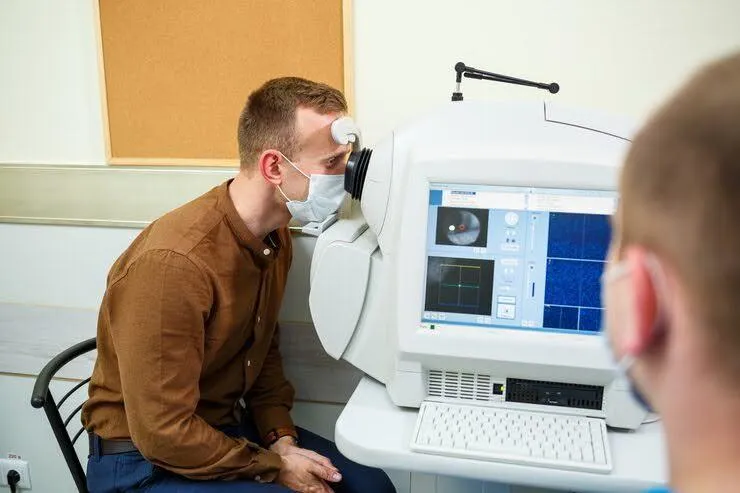
Telemedicine eye care is rapidly growing, providing valuable options for patients in rural areas or when clinic access is limited. While virtual screenings cannot fully replace in-person exams, they serve as a convenient first step for early detection. AI tools enhance the accuracy and ease of these remote screenings, helping identify potential eye issues sooner.
Many tele-optometry services now use apps or devices that allow users to perform basic vision tests at home. With AI assistance, these tools can flag concerns and recommend follow-ups with an eye care professional.

At Kleinwood Vision, we believe technology should expand access without sacrificing quality of care. Remote tools may become part of future comprehensive eye exam plans, but they will always work alongside, not replace, thorough in-person evaluations by qualified doctors to ensure the best outcomes for patients.
These advancements are exciting but require professional guidance to ensure accuracy and safety. While telehealth and remote screenings support early detection and expand access, they can’t fully replace an in-person exam with a licensed optometrist. That’s why our team at Kleinwood Vision continues to prioritize direct patient interaction and trusted clinical expertise. We believe that personalized care, face-to-face evaluations, and hands-on testing remain essential in delivering the highest standard of eye health services.
AI can help triage symptoms or detect early patterns in eye conditions, but it still takes a trained eye to assess what truly matters for your unique care plan. Our clinic uses advanced diagnostic tools such as retinal imaging and corneal topography to provide in-depth, highly detailed views of your eye health—something no app or remote device can fully replicate. These technologies, combined with experienced optometric care, give our patients the most accurate and comprehensive approach to long-term vision wellness.
Smart Glasses, AI Tools, and More
The future isn’t just about diagnostics. Smart glasses technology and AR/VR devices are rapidly emerging as important tools in tomorrow’s eye care. These innovative wearables may soon offer features like navigation overlays, real-time health data tracking, and even assistive tools for low-vision users. Some developers are exploring smart contact lenses capable of displaying information or monitoring glucose levels in diabetic patients, potentially transforming both vision care and general health monitoring.
While many of these devices are still in development, their potential impact is significant. At Kleinwood Vision, we stay informed about the latest advancements in wearable technology to better understand how they could support future treatment plans. For patients interested in cutting-edge solutions to complex vision needs, these tools may become powerful additions to traditional care. Our commitment is to combine innovation with expertise, ensuring patients benefit from the most forward-thinking technologies without sacrificing clinical quality.
What Eye Care Patients Should Expect
Change can feel overwhelming, but when it comes to AI in optometry, innovation is here to support—not replace—your care. Most AI tools are designed to boost accuracy and efficiency, acting as a second set of eyes to help ensure nothing important is overlooked. These technologies enhance the care experience while keeping your optometrist in control.
In the coming years, patients may encounter more AI-assisted screenings, predictive myopia tools, and even remote diagnostics. These features improve early detection and make visits smoother, especially in technology-forward clinics.
Change can feel overwhelming, but when it comes to AI in optometry, innovation is here to support—not replace—your care. Most AI tools are designed to boost accuracy and efficiency, acting as a second set of eyes to help ensure nothing important is overlooked. These technologies enhance the care experience while keeping your optometrist in control.
In the coming years, patients may encounter more AI-assisted screenings, predictive myopia tools, and even remote diagnostics. These features improve early detection and make visits smoother, especially in technology-forward clinics.
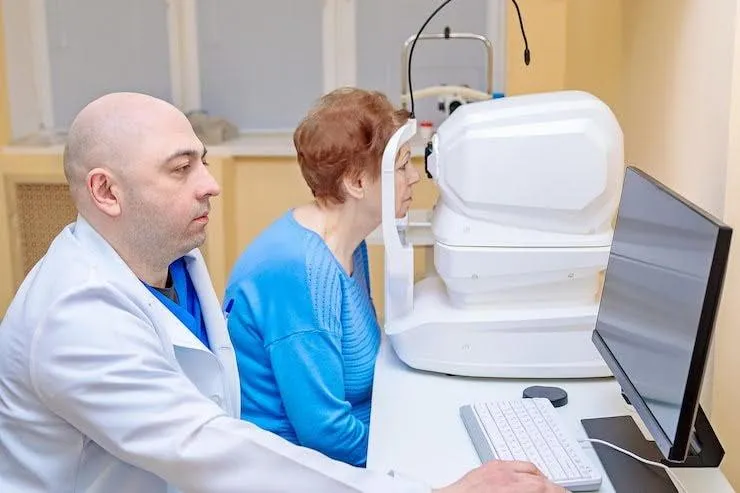

Still, the heart of good eye care remains the same: a personal conversation, a hands-on exam, and a customized treatment plan based on your lifestyle. At Kleinwood Vision, we use AI to enhance—not replace—the expert, compassionate care you trust.
Kleinwood Vision’s Approach to Eye Care
At Kleinwood Vision, we’re committed to integrating modern diagnostic technology to improve patient outcomes. From OCT scanning to digital refraction systems, we use tools that deliver accurate, early insights into your eye health. We believe technology belongs in eye care—but only when it brings real value to patients. As tools like AI in optometry continue to develop, we’re prepared to adopt them responsibly and with a clear focus on improving care.
One example is our current use of retinal imaging and advanced eye mapping, which allow us to detect eye disease before symptoms appear. These technologies are a key part of our comprehensive eye exam, far surpassing a simple vision test. In the future, AI could analyze this data instantly, helping identify early signs of glaucoma, macular degeneration, or other serious conditions with greater speed and accuracy.
We’re also leaders in myopia control and dry eye care, two areas where AI is becoming especially valuable. As predictive modeling becomes more refined, we’ll be able to anticipate vision changes before they impact daily life. This proactive approach supports better outcomes and more customized treatment plans for both adults and children.
You can learn more about how we apply these innovations through our myopia management programs and our specialized approach to pediatric eye health. At Kleinwood Vision, we combine advanced tools with trusted clinical care to offer forward-thinking solutions that never lose the personal touch. We’re proud to lead the way in technology-driven, patient-first eye care.
Future of Eye Care Looks Promising
The future of eye care holds great promise, with patients set to benefit significantly. Artificial intelligence in eye health is advancing rapidly, allowing clinics to deliver faster, more accurate diagnoses and highly personalized treatments. When combined with the expertise of skilled optometrists, AI tools have the potential to revolutionize how eye care is provided in the coming years, enhancing both patient outcomes and overall experience.
However, routine eye exams remain crucial. While AI can assist in early detection of conditions, only a doctor can interpret the results, address your concerns, and customize a treatment plan tailored to your unique needs. The human element in eye care remains essential for optimal health.
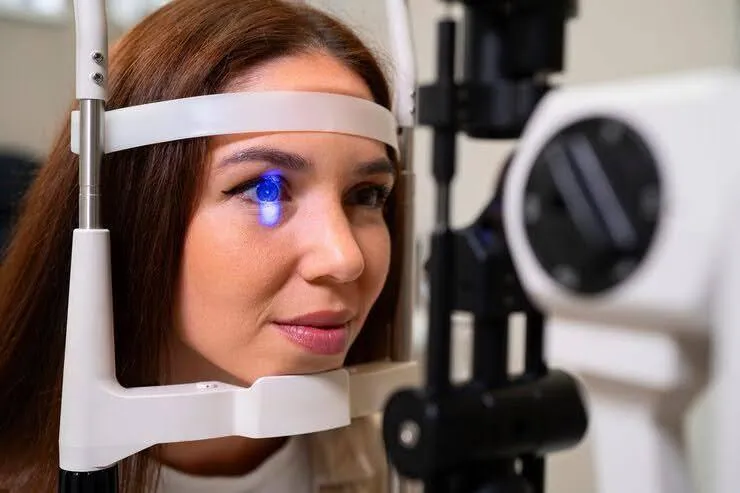
The future of eye care holds great promise, with patients set to benefit significantly. Artificial intelligence in eye health is advancing rapidly, allowing clinics to deliver faster, more accurate diagnoses and highly personalized treatments. When combined with the expertise of skilled optometrists, AI tools have the potential to revolutionize how eye care is provided in the coming years, enhancing both patient outcomes and overall experience.
However, routine eye exams remain crucial. While AI can assist in early detection of conditions, only a doctor can interpret the results, address your concerns, and customize a treatment plan tailored to your unique needs. The human element in eye care remains essential for optimal health.
To fully benefit from these advancements, it’s important to maintain regular eye exam appointments. Consistent visits ensure you receive cutting-edge technology combined with personalized care, helping to preserve your vision and adapt to evolving eye care innovations.
Stay Informed and Proactive for Eye Health
Whether it’s AI diagnostics, smart glasses, or telemedicine eye care, technology is transforming the field of optometry. At Kleinwood Vision, we’re dedicated to staying ahead of these advancements to provide patients with the most effective and comfortable care possible. These innovations offer new ways to detect, monitor, and treat eye conditions early and accurately, improving long-term vision health.
If you want to learn more about the future of eye exams or discover which cutting-edge technologies might benefit you, start by scheduling a routine eye exam. Regular exams remain the best way to protect your vision, with or without AI. For further information, explore our post on advanced eye exam technology to understand how modern diagnostic tools enhance care, making eye health management more precise and personalized. Staying informed and proactive is key to maintaining your eye health.

Contact Info
Hours of Operation
Mon - Fri | 9:00 AM - 5:00 PM
Sat - Sun | Closed
Holiday Hours: We are closed for the following holidays: New Years Day, Memorial Day, Independence Day, Labor Day, Thanksgiving Day, Christmas Day
© 2026 Kleinwood Vision. All rights Reserved.

